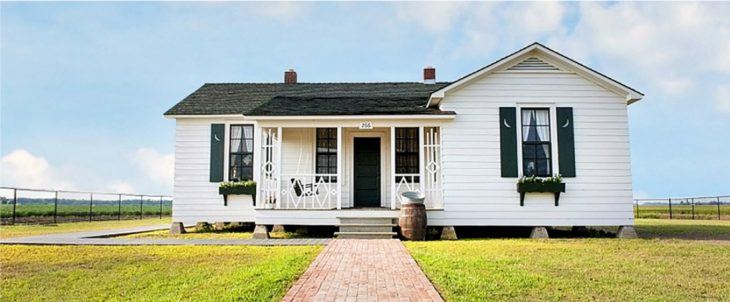Music journalist and author will headline symposium at the Johnny Cash Heritage Festival
by June 14, 2018 6:39 pm 633 views

The restored Cash home in the Dyess Colony.
John Alexander, author of the recently released biography of Johnny Cash that details the music legend’s life through his songs, will headline the list of symposium speakers at the Johnny Cash Heritage Festival slated for Oct. 18-20, in Dyess. Alexander’s presentation will be Friday, Oct. 19.
“I am thrilled beyond words to be speaking at the Johnny Cash Heritage Festival this year,” Alexander said. “So much of Cash’s incredible body of work is steeped in his Arkansas childhood in Dyess. I’m looking forward to visiting the house that he grew up in that inspired songs he wrote such as ‘Five Feet High and Rising,’ and chose to record like ‘Mississippi Delta Land.’ The restoration of the Cash family home acknowledges the significance of his Arkansas roots. I can’t think of a better place to talk about Cash’s legacy.”
Alexander, a music journalist and historian, released “The Man in Song: A Discographic Biography of Johnny Cash,” published by the University of Arkansas Press in April. He has spent years studying the life and music of Cash from his Arkansas childhood through his 2003 death.
He began his career as an assistant professor of English at St. John’s University before being hired as the senior music editor and producer for Reader’s Digest. In 2013, he joined Time Life Music as an artist and repertoire consultant. He is now a songwriter, music producer and senior editor at The Brooklyn Daily Eagle in New York.
Entertainment journalist Jim Bessman describes Alexander’s book as a “breakdown of chapters focusing on autobiographical, geographical, societal and story songs and historic periods like Cash’s breakout Sun records years and final American Recordings output.” In addition, the publication takes a look at songs influenced by Cash’s personal life, including prison recordings, gospel songs and songs written by people who Cash admired and respected.
How the Cash family came to this desolate spot in rural Northeast Arkansas was a common story during a harsh bit of history. Drought, sporadic floods, and the Great Depression decimated family farms in the early 1930s. President Franklin Roosevelt started what was then called a socialistic plan to help many of these farmers in eastern Arkansas.
Ray and Carrie Cash brought their family to the Dyess Colony in 1935, according to historians. The Cashes moved to Dyess with their five children, Roy, 13; Louise, 11; Jack, 5; J. R., 3; and Reba, 1. Joanne and Tommy were born in Dyess.
During that era, the area was more swamp than usable farm ground. Workers drained the swamp and 500 farm families, including the Cash family received 40 acres and a mule through a federal government aid program. Rice and cotton were grown. Johnny Cash, along with his brother, Jack, worked the family farm and attended school. Work in the fields was grueling. At night, Johnny and Jack spent a lot of time in their room.
Jack died in a wood cutting accident as a youth. Music historians attribute Cash’s dark, brooding style to his brother’s unexpected death. Johnny served in the military after high school. He came home periodically to visit his parents. They moved to Memphis in 1956. Cash returned to his old homestead years after he became internationally famous with songs such as “Folsom Prison Blues,” “Walk the Line,” “Ring of Fire,” and others.
